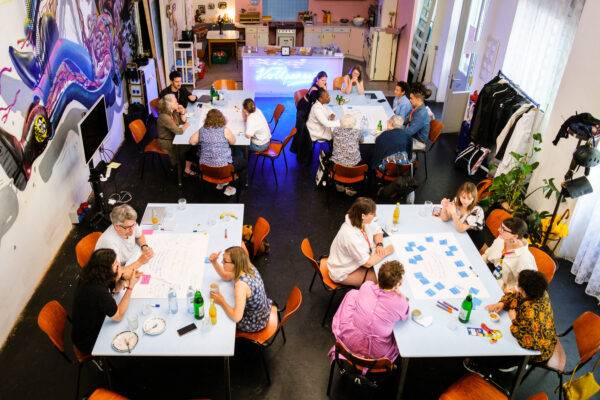Author: Jakob Detering
It’s election season in Austria. The streets are filled with campaign posters, TV debates are endless, and your social media feed is probably overflowing with election ads. The air is thick with talk about Austria’s many societal challenges—rising inflation, the climate crisis, education, healthcare, and more.
While politicians are busy outdoing each other with detailed descriptions of these issues, their proposed solutions often feel repetitive and superficial. Sometimes, I’d like to shout to these campaigning politicians: Take a look at the growing field of social entrepreneurship! And they wouldn’t even have to look far. Right here in Austria, deeply embedded in our communities, countless social entrepreneurs are showing us another way—demonstrating how we can tackle big societal problems with innovative, business-oriented approaches.

Yet, the fact that social entrepreneurship still doesn’t receive the political attention it deserves is nothing short of a missed opportunity. In times of multiple crises, we need social innovation more than ever. Social enterprises, with their economically, socially, culturally, and environmentally focused business models, offer innovative solutions to the societal challenges of our time. At the intersection of business and society, they complement state measures and civil society activities with a shared goal: to foster the positive development of society, the environment, and local communities.
At Impact Hub, we’ve been striving for stronger collaboration with policymakers for over a decade. Back in 2014, we took the lead, alongside private and public partners like FFG, aws, the Federation of Austrian Industries, the Vienna Business Agency, WU Vienna, Arbeitplus, Ashoka, and others, to create a multi-stakeholder group dedicated to social entrepreneurship. Our ongoing efforts have focused on improving the conditions for social entrepreneurs in Austria.
In the lead-up to the upcoming national elections, we’ve been actively engaged throughout the year in the dialogue process #MitSinn, initiated by wirkt, Ashoka, and SENA. Together with many players in the field, we developed a comprehensive list of demands for politicians—especially the next government. The result? A detailed roadmap for more social innovation and social enterprises in Austria, packed with over 80 specific proposals for the political sphere.

Out of this extensive catalog, I want to highlight three key points that I believe are particularly important:
We are calling for the development of a national strategy for social innovation and social entrepreneurship. Such a coordinated national strategy is essential to effectively promote and sustainably anchor social innovations. It will enable the efficient implementation of measures, pooling of resources, and stronger collaboration among different stakeholders, providing a foundation for systematically fostering social innovation.
An important step in this direction would be establishing a National Expert Council composed of representatives from civil society, business, and academia to advise the government on implementing the strategy. This council would serve as a forum for dialogue and a development lab to advance the field in Austria’s interest.
Austria should follow the example of many EU member states and the recommendations of the European Commission. Germany, for instance, launched its National Strategy for Social Innovations and Public Benefit Enterprises in 2023. Other countries, such as Sweden, Ireland, Scotland, and Croatia, adopted similar strategies and action plans years ago. It’s high time for Austria to catch up.
Social enterprises need a tax incentive system to establish and scale their positive societal impact. In line with the development of a new legal framework, appropriate tax measures should be introduced specifically for social enterprises, such as:
We don’t have to reinvent the wheel here: the European Commission is already working on mappings and comparative studies for tax incentive systems for social innovation and social enterprises as part of the Social Economy Action Plan. These studies could guide Austria in developing its own tax measures to boost social innovation and entrepreneurship.
Equally important is creating tax incentives for private and institutional investors who want to support social innovations and social enterprises.
We propose establishing a National Fund for Social Innovation to provide targeted, impact-oriented financing, particularly for scaling and integrating social innovations systemically.
A concrete idea could be for the Austrian Research Promotion Agency (FFG) to create a “Social Innovation Voucher,” modeled after the Innovation Check. This would serve as a low-threshold funding program, enabling small and medium-sized enterprises and nonprofit organizations to develop socially innovative initiatives within their areas of activity. It would also create opportunities for exchange and learning, helping these entities evolve their offerings for the common good and identify new socially oriented business fields.
A potential source of funding could be “dormant assets,” such as unclaimed accounts. A suitable concept and legal framework should be created for this purpose. Impact-oriented innovation funds using dormant assets already exist in several European countries, and a similar fund is being set up in Germany.
With even less financial risk, a proposal to create a bridging finance facility could also be explored. Social enterprises often have to make significant advance payments, even when grants or philanthropic funding have already been promised. A vehicle that provides bridging finance (ideally interest-free) in a simple and non-bureaucratic way would greatly ease the work of social enterprises and amplify their impact. Such a vehicle could be offered through partnerships between banks and public funding bodies.
If any of this has sparked your interest, you can dive deeper into these and many other demands at www.mitsinn.co.at. There, you can also sign up for the #MitSinn newsletter to stay informed about further developments.

About the Author: Jakob Detering is our Managing Director, leading the portfolio of Impact Hub, Climate Lab and Future Health Lab. A recognized impact entrepreneur and organization builder, Jakob also has been a key driving force in transforming the Social Impact Award into the world’s leading community of early-stage social entrepreneurs. He brings extensive experience in scaling social ventures and driving systemic change across Europe and beyond.
Sign up for our free global membership perks, incredible opportunities and monthly inspiring updates!